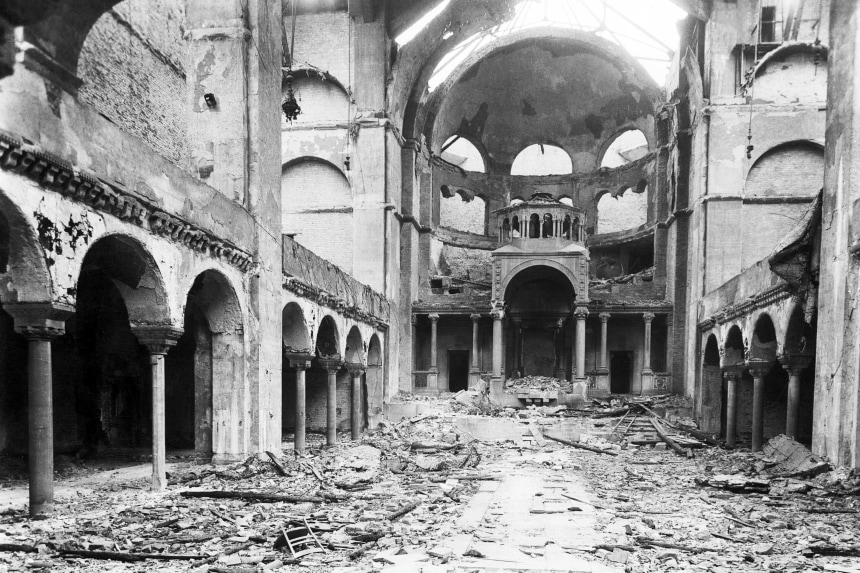On Thursday, people gathered at schools, municipal halls, synagogues, churches, and the parliament all across Germany to mark the 85th anniversary of Kristallnacht, often known as the “Night of Broken Glass,” when the Nazis tormented Jews in Austria and Germany.
The principal Jewish leader of Germany, Josef Schuster, together with Chancellor Olaf Scholz were scheduled to speak at an anniversary celebration at a synagogue in Berlin that was targeted by firebombs a month ago.
The pogrom is being remembered at a time when antisemitism in Germany is once again on the increase in the wake of Hamas’s horrific assault on October 7, which left 1,400 people dead in Israel and started the current conflict in Gaza.
“During Kristallnacht, I was there. Holocaust survivor Herbert Traube said, “I was in Vienna back then,” on Wednesday at a commemorative gathering in Paris.

“I heard the phrase “Never again” a lot. It was a recurring theme in discourse for many years, according to Traube, who expressed his displeasure at the persistence of antisemitism as well as the absence of a “massive popular reaction” to it.
On November 9, 1938, 7,500 Jewish shops were damaged and at least 91 individuals were murdered by the Nazis. Furthermore, according to Israel’s Yad Vashem Holocaust memorial, they set fire to around 1,400 synagogues.
A large number of the up to 30,000 Jewish males who were detained were sent to concentration camps like Dachau or Buchenwald. Years before formal mass deportations started, hundreds more people killed themselves or suffered abuse in the camps.

The Nazi government spread panic among Jews in Germany and Austria on November 9, 1938. The pogrom, sometimes referred to as Kristallnacht, or the “Night of Broken Glass,” marked the turning point from persecution to genocide during the Holocaust.
That terrible night, hundreds of individuals were beaten and murdered by Nazi mobs who also broke windows of Jewish-owned shops and synagogues and stole their valuables. The murder of Ernst vom Rath, a German ambassador stationed in Paris, by Herschel Grynszpan, a young Jewish man whose family had been expelled from Germany, set off the violence.
Grynszpan’s murder provided the Nazis with an excuse to target Jews throughout the Reich in concert. To carry out the pogrom, they organized the Sturmabteilung (SA) and Schutzstaffel (SS), their paramilitary forces, together with common civilians.

The crowds, equipped with clubs, crowbars, and torches, stormed into Jewish communities. They murdered and assaulted hundreds of people while smashing windows of Jewish-owned shops and synagogues and stealing their possessions. After two days of violence, more than 1,400 synagogues had been destroyed by fire and over 7,500 Jewish-owned businesses had been attacked.
An important turning point in the Holocaust was Kristallnacht. It signaled the end of the legalistic façade and the start of the systematic persecution of Jews. The Nazis passed a number of anti-Semitic legislation in the months that followed, such as the Nuremberg legislation, depriving Jews of their rights and German citizenship. Additionally, they started sending large numbers of Jews to concentration camps.
Although Kristallnacht was a terrible night in German history, it serves as a reminder of how important it is to combat bigotry and prejudice. The lessons learned during Kristallnacht and the victims themselves must never be forgotten.
Antisemitism’s Comeback in Germany
Antisemitism in Germany has sharply increased in recent years. The emergence of right-wing extremism, the flood of refugees from nations with a majority of Muslims, and the continuous conflict between Israel and the Palestinians are some of the causes of this.
Over 2,300 antisemitic offenses were reported by the German Interior Ministry in 2020, the most since statistics have been kept in 2001. This included verbal and physical abuse as well as vandalism.
It has been especially alarming to see how antisemitism has increased among young people. According to a 2018 research, 25% of Germans under 25 had antisemitic beliefs.
Antisemitism has returned to Germany for a variety of causes. The emergence of right-wing extremism is one cause. Recent years have seen an increase in the popularity of neo-Nazi organizations, who have been implicated in many antisemitic incidents.
The flood of refugees from nations with a majority of Muslims is another aspect. Numerous of these refugees are from nations with high rates of antisemitism. Antisemitic events have increased since they arrived in Germany.Night of Broken Glass
Lastly, antisemitism in Germany has increased as a result of the continuous conflict between Israel and the Palestinians. The war has often used as a cover for anti-Semitic incidents.Night of Broken Glass
The Value of Countering Antisemitism Night of Broken Glass
It is quite concerning that antisemitism is on the rise in Germany. It’s important to keep in mind that antisemitism encompasses discrimination and hate speech in addition to hatred of Jews. Antisemitism must be combated since it may result in violence and persecution against Jews.
The struggle against antisemitism may take many different forms. One is to educate people about the risks of antisemitism and the Holocaust. Another is to provide assistance to groups fighting antisemitism. Lastly, it’s critical that we denounce antisemitism wherever we encounter it.
Although Kristallnacht was a terrible night in German history, it serves as a reminder of how important it is to combat bigotry and prejudice. The lessons learned during Kristallnacht and the victims themselves must never be forgotten.Night of Broken Glass
In summary
The Holocaust saw a turning point with Kristallnacht, which signaled the shift from persecution to genocide. It is critical that we keep this incident in mind and combat antisemitism wherever we encounter it.Night of Broken Glass
SOURCE : NBC NEWS





